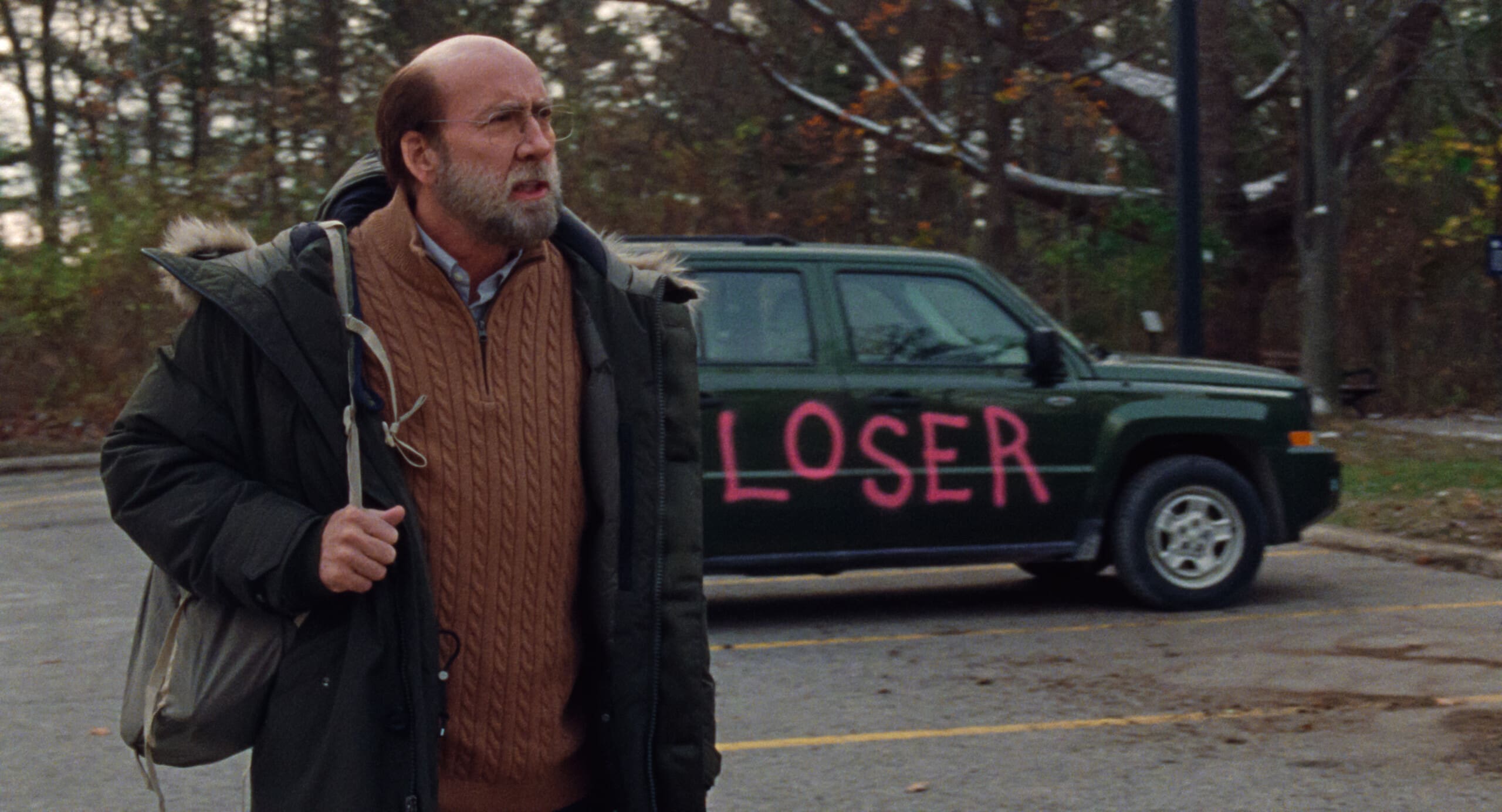
At this stage in Nicolas Cage’s career, nearly every movie he makes feels like a parody of a Nicolas Cage movie. That’s certainly true of his latest, the A24 and Ari Aster–produced, Dream Scenario. Written and directed by Kristoffer Borgli, it stars Cage as Paul Matthews, a boring, desperate college biology professor who becomes world-famous when he starts appearing in people’s dreams. The set-up inevitably allows Cage to get into wacky situations and the film is best when it’s an absurdist comedy about a family man struggling with success. It’s when it tries to make its central metaphor mean something that it slips up.
When it starts and for much of its runtime, Dream Scenario looks and feels like a ‘70s or ‘80s family drama on the level of something like 1980’s Ordinary People or Alexander Payne’s new throwback film, The Holdovers. Cinematographer Benjamin Loeb’s images are grainy and warm. Paul and his wife Janet (a brilliant Julianne Nicholson) are styled as if they’re stuck in the past, their makeup/hairstyling and their comfy sweater-filled wardrobes feel trapped in their long-gone college years. Similarly, the Matthews family’s rapport feels like something out of a prime time sitcom. When youngest daughter Sophie (Lily Bird) first starts dreaming of her father, she’s teasing but clearly adores him and her older sister Hannah (Jessica Clement) clearly feels the same despite the cell phone permanently attached to her hand. There’s real love in the Matthews’ cozy home—which is what makes the dream sequences so unnerving.
For most of the film, the dreams are merely strange. In Sophie’s first, Paul stands passively raking leaves in their backyard as Sophie, screaming in fright, is sucked into the air. In one of his student’s dreams, in which one of the college’s large common spaces seems to crumble in some sort of earthquake, Paul walks calmly through the chaos. In another, Paul talks about rare mushrooms and smiles pleasantly as his student is murdered. While the dreams contain some disturbing images, the dreams are overall fascinating and weird, beautiful and transporting even as they contain inherent threats.
However, this wouldn’t be an Aster production if things didn’t take a turn for the sinister and after Paul crosses a certain line, he becomes the attacker in everyone’s dreams and his ego takes a hit as his fame turns to infamy. That shift—especially given the action that may spark it—is a pretty obvious metaphor for cancel culture on Borgli’s part and Dream Scenario becomes both tiresome and thoughtless as it expands that metaphor.
Even if Paul may inadvertently cause the shift, there’s enough ambiguity in the film’s plotting that what happens to him could be just as random as his showing up in people’s dreams in the first place. In Paul’s case, he remains as passive in his real life as he was in the initial dreams, yet when he becomes the attacker in everyone’s dreams, the culture turns on him because of what they imagine he does rather than anything he’s actually done. Yet in real life, even if widespread cancellation is on some level driven by what people imagine a person has done, the metaphor here erases the very actions that make cancellation necessary and possible. Paul is pure victim, swept up in the mob’s whims and punished for absolutely nothing. It’s a metaphor that leaves those traumatized and calling for some sort of justice looking like unreasonable villains while the target of their anger is unjustly ruined.
While Borgli’s weak metaphor is disappointing in its own right, it’s especially annoying in that it distracts from the film’s otherwise very strong character beats and family dynamics. Paul is kind of pathetic, desperate for greatness but not ambitious or assertive enough to chase his dreams. One of the first things we see him do is essentially beg a former colleague not to publish research she stole from him, his anger dissipating into whining at his ineffectualness. There’s both genuine comedy and pathos in watching Paul’s annoyance as he realizes how passive he is in everyone’s dreams. For his part, Cage does strong work portraying both that annoyance and Paul’s attempts to make the most of his fame, doing some of his most restrained work in years as Paul simpers and strives. Similarly, Nicholson is strong, tracing Janet’s growing disgust as Paul changes from a dope to a total egomaniac. The film’s final moments refocus on their connection and there’s real satisfaction in the way those scenes wrap up the film’s narrative and emotional threads.
Dream Scenario is as weird as you expect from the premise. For those looking to see Cage do some weird shit, it absolutely delivers. It’s funny and bizarre with textured visuals and strong performances. Where it falters in trying to make its silly set up mean something larger. Its central metaphor is thoughtless and uninteresting, an examination of our culture that already feels out of date. Still, even as Dream Scenario fails on an intellectual level, it’s funny and well-made enough that skipping it would be a mistake.

